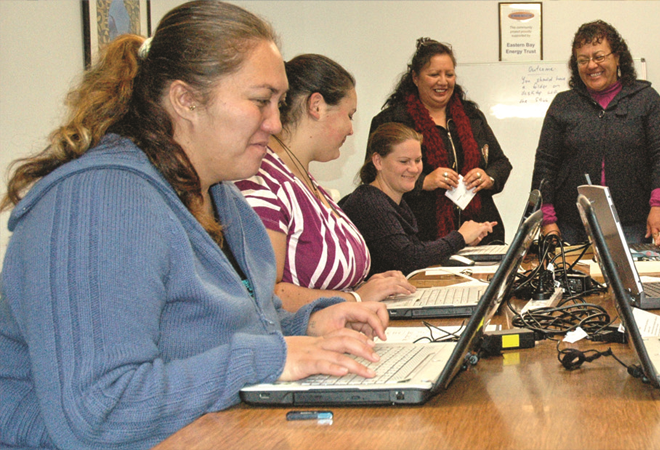
Te Puawaitanga o Te Kakano: Nurturing the Seeds of Learning Within Rural Māori Women
Status
Completed: 1 December 2010
Project Details
A project to develop a Good Practice Publication, undertaken by the Opotiki Community Activities Office (Adult and Community Education (ACE) provider), describing how the early childhood Māori management/learning model of 'Atawhaingia Te Pa Harakeke' has been incorporated into ACE practices in order to better meet the learning needs of Māori women.
Aims:
The main aims of the good practice project were to:
- describe the implementation of a participative management model in a rural area with high numbers of Māori women
- reshape the way adult community education is delivered to Māori, especially to rural Māori women
- recognise the cultural values, practices and life experiences Māori women have as adults, women and young mothers
- help re-engage Māori women with learning
- describe how delivery was shaped by the participants within programmes of learning
- provide data to show how this approach has accompanied increases in enrolments, retention and progression to further learning over the three years of the programme.
Methodology:
The project used a mixed method approach involving:
- qualitative data from the programme participants
- quantitative data on enrolments, retention and progression to further learning.
Team
Faithe Hanrahan
Opotiki Community Activities OfficeStatus
Funding
$5,000.00 (excl GST)
Key Findings
The key findings and learnings from the project included:
What have we learned?
- It is possible to adapt models of participative management to meet the needs of learners in another education arena, when the underpinning values and philosophies are aligned with those of our learners.
- For some rural Māori women their ‘life circumstances’ mean they often need additional support to become engaged in learning.
- Embedding spiritual values and cultural practices to which Māori women can relate is a necessity in helping them realise their learning purpose and potential.
- Māori women respond well to older Māori women who have credibility in their eyes and to whom they are able to relate either culturally or socially.
- Learning to be seen as more than just a mother is important in helping Māori women learners find themselves and their voices.
How successful have we been?
- Enrolment numbers and numbers of women enrolled in formal learning (NCEA) have quadrupled over the three years of the programme.
- Forty percent of women are returning for further bridging study after a year and those who have gone on to tertiary study continue to do well with ongoing support provided on a case-by-case basis (completions data not available yet).
- The Māori Women’s Welfare League have set up a tertiary scholarship to assist Māori women with tertiary study.
- The initial Te Puawaitanga o Te Kakano programme has been modified and duplicated in three other organisations in the Eastern Bay of Plenty.
Key Recommendations
The key recommendations from the project included:
New ways of delivering ACE | When information and the responsibility for the management of ACE is shared in the way the Māori participative management model suggests, positive things happen. Former ways of planning and delivering ACE need to change and become more flexible to accommodate the flow of creativity and synchronicity that often comes from group discussions. Such dialogue needs to be open and ongoing as learners’ experiences and views change with each bit of new learning and personal insight.
Staff knowledge of Māoritanga | Use of participative management models embedded in principles of Māoritanga require staff who have a sound knowledge of and background in Māoritanga and Kaupapa Māori.
Community organisations and networks | Community organisations, such as the Māori Women’s Welfare League, that share similar visions and aspirations are assets just waiting to be used. Strong community networks outside education also need to be nurtured.
Government support | Government departments need to work together more closely for the good of their individual clients (learners), otherwise learners are likely to give up on pursuing their learning dreams and remain on the ‘unemployment wheel’.
Additional funding support | Additional funding support is necessary to enable participation by Māori Women in present and ongoing learning.
Management of learning programmes | Management of learning programmes needs to be flexible enough to reflect the contextual approach required by adult learners who have busy lives centred on the raising of children and part-time work.
A guide prepared by Faithe Hanrahan.
(PDF, 579KB, 10-pages).
- 1 December 2010